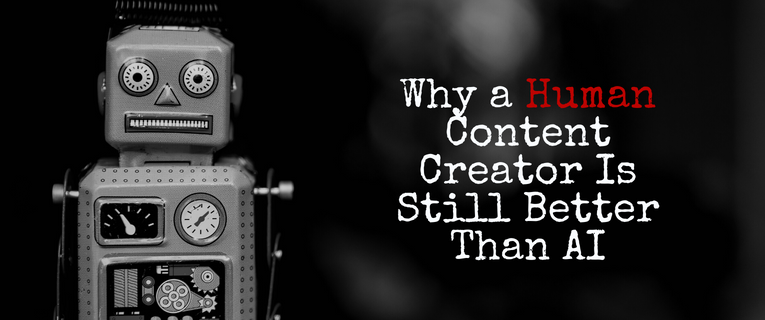AI technology is starting to become a part of everyday life. We’ve already invited virtual assistants like Siri and Alexa into our homes, embracing that AI can help us with simple and tedious tasks. But what about in the workplace? Is AI starting to replace jobs?
Valued at $136.6 billion, the global AI market, including chatbots like ChatGPT, is taking the marketing world by storm. Some see chatbots as easy solutions to keeping up with countless message systems since they can automatically respond to consumers using smart technology. In theory, these bots can answer common questions and respond intelligently. However, many chatbots, and even the cutting-edge ChatGPT, are known to make mistakes that a human handler wouldn’t.
This AI technology is starting to bleed into the content writing industry, with AI writing systems improving every day. Some studies say 90% of online content will be AI-generated by 2026. But here at Little Red Writing, we don’t think AI will be able to recreate that human touch to content marketing anytime soon. Although AI is unique and cool, there is still so much it has to learn (and may never be able to learn) before it can generate emotionally intelligent content.
AI Still Doesn’t Understand Language
Many marketers have tried using AI content creators and article spinners to write brand new content for their websites. But that’s the problem with AI: it isn’t writing anything new at all. AI works by taking the top-ranking search results for a topic and rewriting them so they don’t get flagged for plagiarism. This will often result in strange, nonsensical writing by AI because it’s trying to find synonyms and new ways to word the same commonly used information and statistics to avoid plagiarism. English just doesn’t work that way. It requires a human writer to fully understand the nuances of word usage, popular phrasing, and basic writing knowledge. Otherwise, you’re going to end up with an unintelligible dumpster fire of relevant keywords with no logic behind them. And all those keywords aren’t going to help you get higher SEO.
AI Can’t Create New Content
As mentioned above, AI writes by reworking what already exists to avoid plagiarism. That means AI-generated content isn’t coming up with new information or perspectives, so what’s the point? AI can automate tasks to increase a company’s productivity and reduce costs, but AI-generated content isn’t going to attract consumers in the same way that human-generated content will—potentially resulting in a lack of user interest and, ultimately, less profits. No one wants to research a topic and find that every single article says the same thing with different words. Your brand can’t stand out with regurgitated information.
In fact, Google can actually penalize AI-written content. A recent update in August of 2022 adjusted Google’s algorithm to prioritize people-first content, focusing on new, quality content that is useful to readers. Content written by AI is only recycling information from the top-ranking search results, so it will rank lower in usefulness with this new algorithm. That’s why AI-generated content just isn’t going to cut it.
AI Doesn’t Have Emotional Intelligence
Most of all, AI-generated content just doesn’t have that human touch. Emotional intelligence is the balancing act of managing customer relationships while keeping brand goals in mind. AI bots can’t create inspirational stories that will make readers laugh or cry. They don’t have a real sense of empathy or humor; chances are, they never will: that’s what makes us human.
Humans are also better at understanding social issues, distinguishing facts from opinions, and knowing what readers will care about the most. AI is much better at presenting simple facts and statistics, but if you want fresh, thought-provoking content, you’re only going to get it from a human writer.
We can see that human writers are ten times more valuable than AI bots. But can human writers still use AI to help them in their writing process?
How Human Writers Can Use AI
AI software can still gather data points and keywords to give human writers a starting point for their content. AI can determine what competitors are talking about, so you can find out what kind of content to address and how to do it better. AI bots can also generate ideas and drafts that writers can use as a rough foundation to jump off of, especially if they’re struggling with writer’s block. Finally, we already use simple AI every day through word processors (Grammarly, anybody?). AI is helpful for editing things like grammar, spelling, and rearranging sentence structure, but make sure you don’t rely too heavily on AI. Human editors are also better at their jobs than AI.
If you decide to opt for AI-generated content, or you have in the past, we’re always here to help humanize the content you already have. We’re good at keeping it personable and endearing while still focusing on facts and quality writing. If you need to infuse your content with a little bit of humor and a friendly perspective, reach out to us.
While simple AI can help some human writers upgrade their writing skills, we know that the most impactful content is written 100% by people. Here at Little Red Writing, we believe in the magic touch that human-written content holds, and we’re here to write you that quality content that AI just can’t keep up with.





